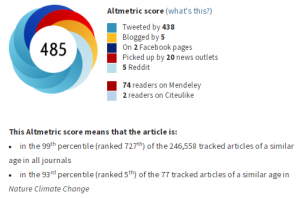By Tim Sulser, IFPRI—
Several IFPRI-based GFSF researchers were pleased to join with other authors from AgMIP (led by Tomoko Hasegawa from the National Institute for  Environmental Studies of Japan) to publish an article, "Risk of increased food insecurity under stringent global climate change mitigation policy," in Nature Climate Change. The article can be found at https://doi.org/10.1038/s41558-018-0230-x.
Environmental Studies of Japan) to publish an article, "Risk of increased food insecurity under stringent global climate change mitigation policy," in Nature Climate Change. The article can be found at https://doi.org/10.1038/s41558-018-0230-x.
 One of the key findings of the article is that implementation of strict climate mitigation policies can have an even greater effect on food security than climate change itself, at least until mid-century.
One of the key findings of the article is that implementation of strict climate mitigation policies can have an even greater effect on food security than climate change itself, at least until mid-century.
There are important additional messages that should not be overshadowed by this finding, however.
- The emphasis here should be that careful consideration of different policy alternatives and complementary programs will be needed to avoid unintended consequences.
- Climate change effects are expected to be much more severe later in the century than what we are likely to experience between now and 2050. Mitigation is necessary to reduce the burden of these effects, especially in tropical and lower income countries where they are likely to be the most severe.
- Thus, many of the benefits of (mindful) climate mitigation actions taken sooner rather than later will likely be stronger in the latter half of this century.
 This was a provocative study and it is stimulating a good deal of discussion across news and social media sources (see Altmetric score at this link). Hopefully this active exchange of ideas will help inspire smarter designs for implementation of climate mitigation policies and programs.
This was a provocative study and it is stimulating a good deal of discussion across news and social media sources (see Altmetric score at this link). Hopefully this active exchange of ideas will help inspire smarter designs for implementation of climate mitigation policies and programs.





